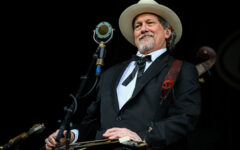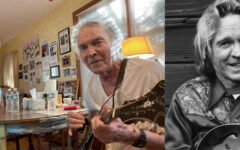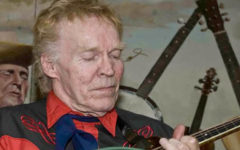
Happy New Year, friends and readers! 2024 is here at last. It’s one of those special every four years in the cycle leap years: you know, the ones with the extra day in February, the summer Olympics, and a US presidential election. Does it strike fear in your heart? An extra day in February often has that effect on people, and I sympathize.
Rather than distract yourself with hard-to-keep New Year’s resolutions (“I will practice the banjo 18 hours a day while managing to stay married and employed”), why not take our annual Bluegrass Quiz? This is the quiz that used to be called the Bluegrass Knowledge Test, but required a name change because of a lawsuit threat that could have cost Bluegrass Today almost $85. A bluegrass think tank (probably the famous Committee of Five People who secretly control everything in our business) came up with the new name “Bluegrass Quiz.” It took them three days of meetings and presentations, and that was their compromise name. If you’d heard the other recommendations, you’d understand.
With the name change came the introduction of a letter grade system because a few hyper-sensitive types complained that classifying someone as an “ignorant bluegrass fool” was a little harsh. Now they just get a nice soft “D” grade.
Here, reprinted from previous years, is your guide to what the letter grades mean (the word “ignorant” has been stricken from the earlier versions):
Seven correct answers earns you an “A”: you are a full-fledged bluegrass expert (read: “geek”). If someone spouts some questionable bluegrass information on Facebook or some other medium known for questionable information, you are well within your rights to chime in with a haughty, “I beg to differ,” and people should pay attention, even if they won’t.
Five or six correct answers gets you a “B” rating: You’re clearly well-versed in this music and probably know which racehorse died, Molly or Tenbrooks, if not the specific cause of death. People find you a bit of a know-it-all, but you carry it well. At least you’re not part of the reviled “bluegrass elite,” as those with A ratings and a basement full of vintage instruments sometimes are.
Three or four right: You’ve earned a “C.” You know just enough about the music to be humbled by how much there is to know. You love the music, and you know that Lester Flatt and Earl Scruggs used to play in Bill Monroe’s band; you just don’t know when or what songs they did. Isn’t that enough? You have the potential to score higher in future quizzes, but you may or may not bother.
One or two right: You’ve been graded a “D,” and that’s being generous. You know a thing or two, sure, but you also probably spell Alison Krauss’ name with two Ls and think the Stanley Brothers’ first names were “Ralph and Harpo.” You’re ideally suited to make some of the Facebook posts mentioned above. After all, who’s to say what’s true and what isn’t, anyway? This is music. Let’s enjoy it!
Are you ready? To make this fair, yet challenging, I’ve tried to make these answers difficult to google. The quiz will start easy and get progressively harder.
1. Before he started the Blue Grass Boys, Bill Monroe played as a duo with his brother . . .
A. Birch Monroe
B. Charlie Monroe
C. Vaughn Monroe
D. Monroe Monroe
E. Jehoshaphat Monroe
2. Jimmy Martin’s band, the Sunny Mountain Boys, was named after which song?
A. Keep on the Sunny Side
B. On the Sunny Side of the Street
C. Sunny Side of the Mountain
D. How Sunny Were the Mountains, Josephine?
E. The Mountains Are Always Sunny in Kuala Lumpur
3. Complete the following line from this bluegrass standard:
I know what it means to be lonesome
I know what it means to be . . .
A. Hurt
B. Drunk
C. Justifiably irritated
D. Blue
E. Green
4. In 1995, Alison Krauss scored a big hit with a remake of the Keith Whitley song, written by Paul Overstreet and Don Schlitz, called . . .
A. When You Say Nothing at All
B. When You Put a Sock in it
C. When You Recite the Hippocratic Oath
D. When You Say it in Spanish
E. When You Quack Like a Duck
5. The vintage Gibson mandolins most sought-after by bluegrass musicians were signed by . . .
A. Orville Gibson
B. Andrew Lloyd Webber
C. Lloyd Loar
D. Lloyd of London
E. John Hancock
6. Bill Monroe’s bass player in the mid and late 1940s was known as Cedric Rainwater, which was a stage name. What was his real name?
A. Jody Rainwater
B. William Apostol
C. George Santos
D. Howard Hughes
E. Howard Watts
7. Which of the following musicians was not ever a member of the Lonesome Pine Fiddlers:
A. Curly Ray Cline
B. Ezra Cline
C. Albert Punturi
D. Larry Sultana
E. Paul Williams
Answer Key:
1:B, 2:C, 3:D, 4:A, 5:C, 6:E, 7:D







